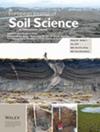On‐Farm Assessment of Long‐Term Impacts of Regenerative Management on Vineyard Soil Health
IF 3.8
2区 农林科学
Q2 SOIL SCIENCE
引用次数: 0
Abstract
Soil health is central to sustainable agriculture and a key goal of regenerative and organic farming. However, monitoring changes in soil health remains challenging due to the lack of regionally relevant benchmarks and context‐specific indicators. This study assessed the impacts of long‐term and combined regenerative management practices on soil health across 87 California vineyards with diverse management histories, microclimates, and soils. Three key indicators, including aggregate stability, mineralizable carbon, and soil organic carbon, were used to develop region‐specific soil health scoring functions. These were adapted from Cornell's Comprehensive Assessment of Soil Health and the Soil Health Institute frameworks. Indicator values generally trended lower than existing benchmarks, emphasizing the need for crop‐ and region‐specific scoring systems. Results from mixed‐effects models and fuzzy‐set qualitative comparative analysis (fsQCA) indicate that long‐term cover cropping (≥ 10 years) was the most consistent driver of high soil health scores, especially when combined with other practices. Livestock integration improved soil organic carbon and mineralizable carbon scores in under 10 years, showing potential to accelerate soil health benefits. Our results highlight the importance of tailoring practices to local soil and climate conditions. Findings also support the development of more flexible, regionally informed soil health frameworks.再生管理对葡萄园土壤健康长期影响的田间评估
土壤健康是可持续农业的核心,也是再生农业和有机农业的关键目标。然而,由于缺乏区域相关基准和具体情况指标,监测土壤健康变化仍然具有挑战性。本研究评估了加州87个不同管理历史、小气候和土壤的葡萄园的长期和综合再生管理实践对土壤健康的影响。三个关键指标,包括团聚体稳定性、矿化碳和土壤有机碳,用于开发特定区域的土壤健康评分函数。这些都改编自康奈尔大学土壤健康综合评估和土壤健康研究所的框架。指标值普遍低于现有基准,强调需要针对特定作物和地区的评分系统。混合效应模型和模糊集定性比较分析(fsQCA)的结果表明,长期覆盖种植(≥10年)是高土壤健康评分最一致的驱动因素,特别是当与其他实践相结合时。畜牧业整合在不到10年的时间内改善了土壤有机碳和矿化碳得分,显示出加速土壤健康效益的潜力。我们的研究结果强调了根据当地土壤和气候条件定制实践的重要性。研究结果还支持制定更灵活、区域知情的土壤健康框架。
本文章由计算机程序翻译,如有差异,请以英文原文为准。
求助全文
约1分钟内获得全文
求助全文
来源期刊

European Journal of Soil Science
农林科学-土壤科学
CiteScore
8.20
自引率
4.80%
发文量
117
审稿时长
5 months
期刊介绍:
The EJSS is an international journal that publishes outstanding papers in soil science that advance the theoretical and mechanistic understanding of physical, chemical and biological processes and their interactions in soils acting from molecular to continental scales in natural and managed environments.
 求助内容:
求助内容: 应助结果提醒方式:
应助结果提醒方式:


